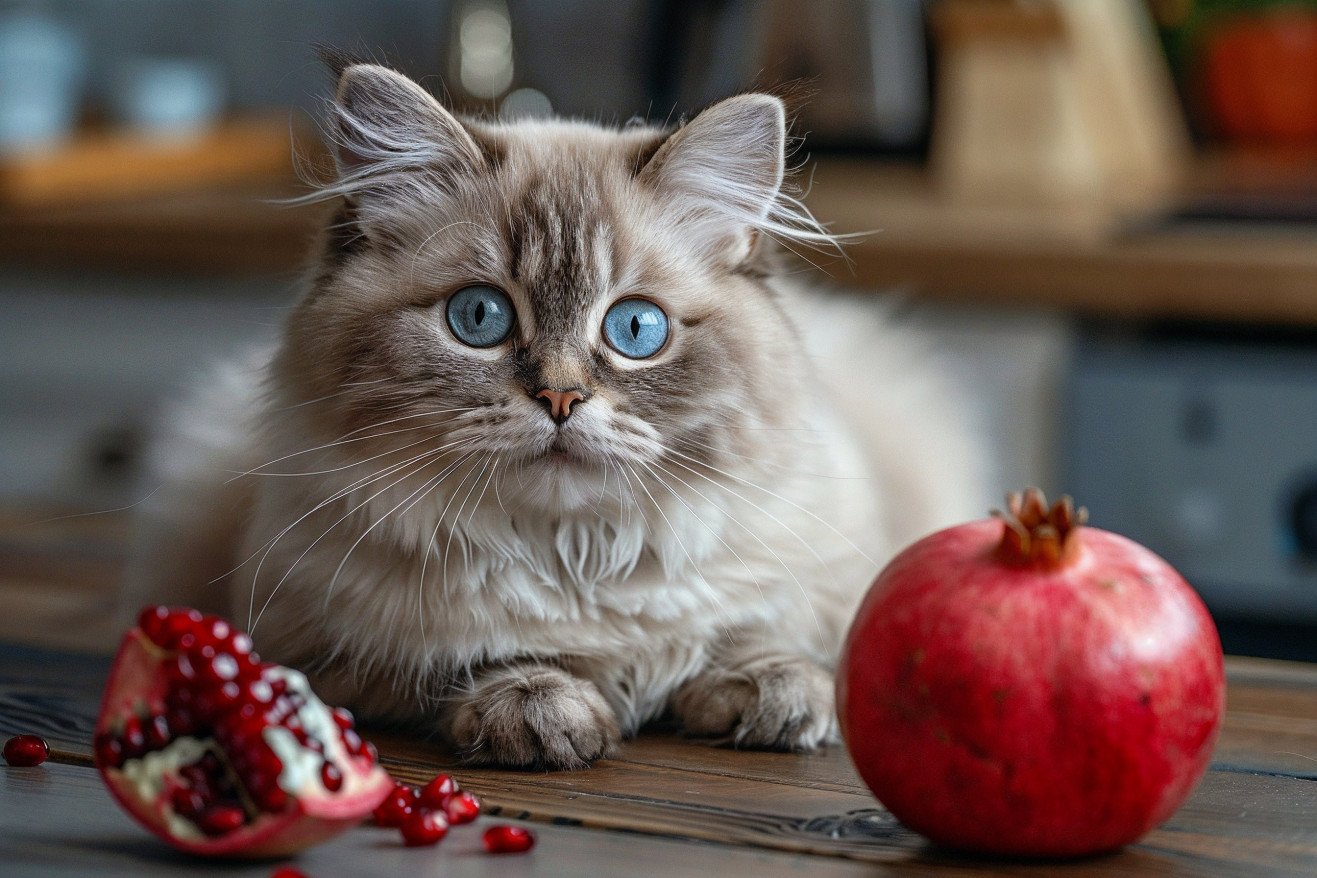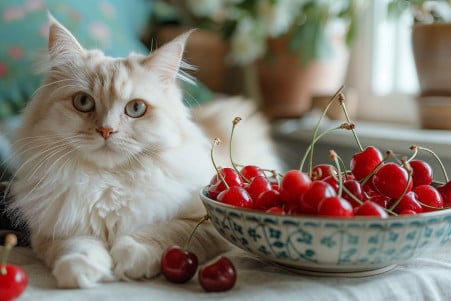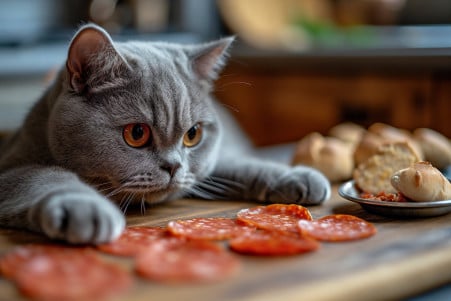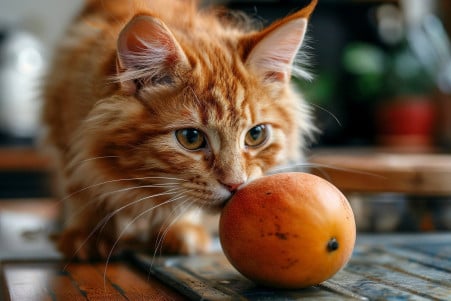Can Cats Eat Pomegranate? Understanding Feline Dietary Needs
20 March 2024 • Updated 18 March 2024

Pomegranates are a nutritious and delicious treat for people, but does the same go for cats? While pomegranates aren’t toxic to cats, they aren’t the best choice for your feline friend. This is because cats are obligate carnivores and don’t need the nutrients that fruit provides. In addition, pomegranate seeds can be a choking hazard and can cause gastrointestinal upset.
In this article, we’ll look at veterinary perspectives and nutritional research to explain what cats should eat. We’ll look at how non-traditional foods in a cat’s diet, like pomegranates, affect a cat’s body and whether or not they are good for cats. Let’s take a look at the science behind cat nutrition to provide evidence-based advice for the best diet and health of your cat.
Can cats eat pomegranate?
Nutritional Requirements of Cats
Knowing what cats need to eat to be healthy is important for their overall well-being. Cats are obligate carnivores, meaning they need certain nutrients that are only found in animal products.
High-quality protein is the most important of these nutrients, as it provides essential amino acids that are critical for a cat’s health. The Cornell University College of Veterinary Medicine explains that cats need to consume a well-balanced diet that includes at least 13 essential nutrients, including vitamins, minerals, fatty acids, and amino acids, with protein being the most important.
Fat is also an important part of a cat’s diet, as it provides energy and helps the body absorb fat-soluble vitamins. Cats get the vitamins and minerals they need to support their biological processes, like calcium, vitamin A, and niacin, from animal tissue. In fact, VCA Animal Hospitals notes that cats don’t have the enzymes necessary to digest plant material, so their diet should contain as few carbohydrates as possible.
Cats’ ancestors came from the desert, so their bodies are designed to conserve water. However, cats still need to have access to fresh, clean water at all times, as Dr. Kimberly Young from Countryside Veterinary Clinic points out. While cats can get some of the water they need from their food, especially if they eat wet food, it’s important to make sure they have plenty of water to drink.
A diet that meets these nutritional requirements will help a cat’s body work the way it’s supposed to and will help avoid unnecessary and potentially harmful ingredients that are found in foods that don’t meet their evolutionary needs, like pomegranate.
Why Pomegranates Are Bad for Cats
While pomegranates are healthy for humans, they are not for cats. One of the biggest reasons is that pomegranate seeds are a choking hazard. Cats have smaller esophagi than humans, and the hard seeds of pomegranates can easily get stuck and cause a choking hazard. This is especially dangerous because cats can’t cough up the seeds once they’re stuck.
In addition, cats’ digestive systems can’t break down the compounds in pomegranates, including tannins and acids, which can lead to digestive upset or worse.
On top of that, the sugar content of one cup of pomegranate is 24.7 grams, according to Spot®, and cats can’t metabolize sugar as well as humans. This can lead to digestive upset and other health issues.
Finally, while pomegranates contain potassium and vitamin K, they don’t contain the proteins and amino acids that cats need.
Because of these reasons, it’s clear that while pomegranates aren’t toxic to cats, they are not good for them to eat. Therefore, it’s best to avoid giving pomegranates to your cat to keep them safe and healthy.
Untangling the Nutritional Web: Pomegranate Compounds and Cats
Pomegranates are loaded with antioxidants and bioactive compounds like flavonoids and hydrolyzable tannins, all of which have been shown to have a variety of health effects in humans.
A study published in PubMed Central notes that these compounds have antioxidant, anti-inflammatory, and anti-cancer effects, all of which could be helpful to cats. However, the question is whether or not cats, with their specific physiology and nutritional needs, can actually use the compounds found in pomegranates.
For example, while pomegranates are high in vitamin C and their fiber and water content can support healthy digestion and hydration in people, the situation is more complicated for cats.
Cats are obligate carnivores, meaning they have evolved to get their nutritional needs met through animal-based foods, and their ability to absorb and use the nutrients in plants like pomegranates may be limited.
In fact, despite the presence of beneficial compounds in pomegranate peels and seeds, as described in a review published in PubMed Central, cats’ digestive systems are not equipped to break down the tough fibers in these parts of the plant, which could potentially cause a blockage in their intestines.
In short, while the bioactive compounds in pomegranates have the potential to benefit cats, it’s unclear whether or not these compounds can be absorbed and used by cats and whether or not they are safe for them. As a result, it’s important to be cautious when considering adding pomegranate to a cat’s diet, especially given their status as obligate carnivores and the potential for nutritional imbalances when they eat non-traditional foods.
How Cats Digest Non-Meat Foods
The cat’s digestive system is a highly specialized system that has evolved primarily to process meat. From the sharp teeth that are designed for tearing through flesh to the short digestive tract, every aspect of the digestive system has evolved to process animal proteins and fats efficiently.
According to Willamette Veterinary Hospital, the digestive process begins in the mouth and ends in the intestines, where the body absorbs essential nutrients and prepares waste for excretion.
When non-meat foods like fruit are added to the cat’s diet, the digestive system, which has not evolved to break down plant material efficiently, can be overwhelmed. Purina explains that the cat’s digestive transit time is 10 to 24 hours, which is a reflection of the cat’s carnivorous digestive system that is not well-equipped to handle high-fiber fruits like pomegranates.
Cats that eat non-meat foods like fruit can experience a variety of digestive problems, ranging from mild gastrointestinal upset to more serious issues. According to Willamette Veterinary Hospital, most digestive issues are caused by dietary indiscretions, which include eating inappropriate foods.
According to the Merck Veterinary Manual, non-meat foods can cause issues like constipation or diarrhea and, in more serious cases, obstructions or toxic reactions. As a result, it’s important for cat owners to feed their pets diets that are in line with their carnivorous biology to ensure they stay healthy and avoid potential digestive problems.
Healthy Snacks for Your Cat
If you’re thinking about giving your cat some treats, it’s important to make sure that the treats you choose will work well with your cat’s specific dietary requirements. Since cats are obligate carnivores, they need a diet that’s high in meat and certain nutrients.
Animal Gator suggests that you give your cat non-toxic treats like a small amount of mashed banana or cooked, unseasoned pumpkin. These treats are easy on the stomach and won’t be a choking hazard like pomegranate seeds.
It’s also important to make sure that you’re not giving your cat too many new treats at once, as this can lead to digestive problems. Perfectly Rawsome notes that it’s important to make sure that your cat is getting the right balance of protein, fat, and vitamins, and they reference the NRC Nutritional Requirements for Adult Cats.
While treats can be a fun way to mix things up, they should be given in moderation to make sure that they don’t displace other important nutrients.
It’s also important to make sure that your cat isn’t allergic to any of the treats that you’re giving them. Cats can be allergic to certain proteins or additives, so it’s important to monitor your cat’s reaction to new treats and talk to your vet if you have any concerns.
By making sure that you’re giving your cat safe, vet-recommended treats and making sure that you’re giving them in moderation, you can make sure that your cat has a varied diet without putting their health at risk.
So, Can Cats Eat Pomegranate?
So, while pomegranates are not toxic to cats, they are not recommended for feline consumption. This is because, as we’ve discussed, cats are obligate carnivores and their diet should be based on animal-based nutrition, which pomegranates do not provide. This is also supported by the potential choking hazard of the seeds and the potential digestive issues that could arise from the fruit’s sugar and fiber content.
Good pet parents will understand and respect the natural dietary needs of their cats and will always talk to their vet before making any changes to their pet’s diet or introducing new foods to make sure they are in line with their cat’s natural dietary needs. Keeping a cat healthy through nutrition is about understanding what to feed them and also understanding what not to feed them.
So, as we’ve gone through the facts, it’s clear that the best approach is to avoid giving your cat pomegranate. This will help ensure that you are keeping them healthy and safe and that they are getting a diet that is both appropriate and nutritious for them.


